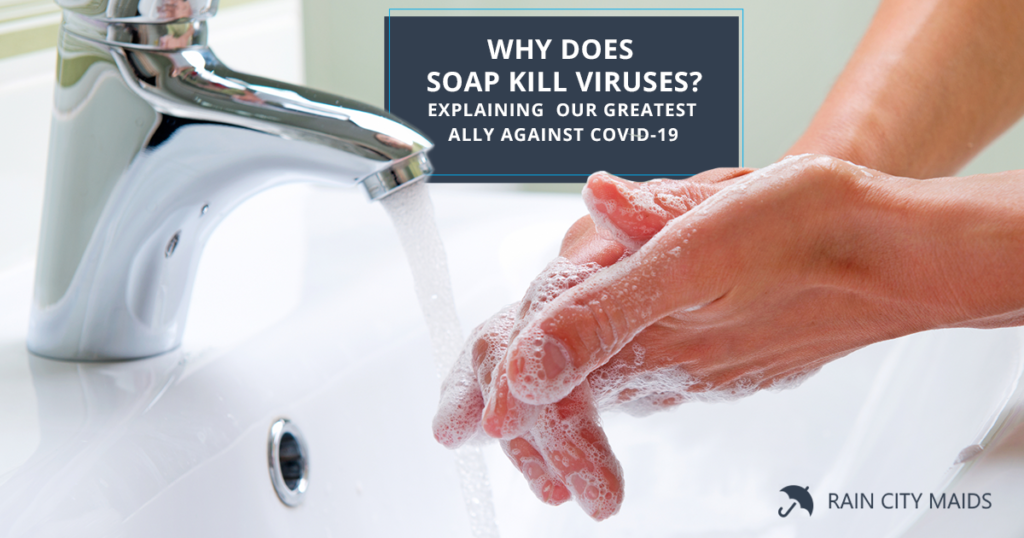We cleaning workers know and appreciate the power of soap and other disinfectants in our daily work. It’s very interesting that in the middle of a global health crisis, a typical product like soap is our best weapon against the COVID-19 threat. We got to learn how it works. Does soap kill viruses? Other products, like hand sanitizer or antibacterial soap, work well enough?
We taught that we should learn some science and chemistry to defend ourselves from the Coronavirus better. As people say: know your enemy. So, we are going to write some brainy words ahead, but don’t worry; the subject is simple enough to understand. First, we’ll know the composition of a virus, then its interactions with surfaces like our skin, and finally, a brief explanation o how alcohol and soap work against them.
Know the enemy: what are viruses made of?
All viruses, including the current COVID-19, are made of three key elements: RNA, proteins, and lipids. The RNA is the genetic material of the virus, similar to our own DNA, the very thing that infects our cells. The proteins have the role of breaking into the target cells, assisting the virus in infecting. And finally, the lipids are the “fat” or “greasy” substance that surroundings the RNA and protects the virus, like a layer or a coat.
However, these three elements are held together by a non-covalent bond, in other words, they aren’t stuck by atomic force like every matter, but by everyday-glue or some organic tissue. Our goal is to separate these elements because when the RNA is on its own, it can’t penetrate cells. The virus becomes inactive.
How a virus interacts with different surfaces
To sum up, viruses aren’t strictly alive like other organic beings, but they do resemble them. They are fragile but microscopic, so it’s difficult for humans to eliminate. But lots of inorganic materials like steel or plastic repel viruses.
The lipid surfaces of the virus stick better over organic, fat, or porose surfaces, like fabric, wood, or skin, where they stay active for a longer time. Over steel or plastic surfaces, the virus tends to fall or disintegrate. That’s why the virus “survives” from hours to days depending on the type of surface. Don’t get too comfortable, though, and disinfect every surface you interact with.
Water vs alcohol vs soap
Now you understand better the structure of the virus and its relation with other materials; it’s time to eliminate them. Just to make things clear: water alone isn’t enough to kill the virus, but it can cause some to fall apart. Alcohol must have 60% concentration or more to be effective against viruses. But, the winner of this competition, your best ally to prevent Coronavirus, is good-old soap.
Who soap works? Well, when you combine soap with water, you create microscopic, fat-like substances called amphiphiles, that are structurally similar to the lipids holding the virus membrane. These amphiphiles dissolve the membrane and dismantle the virus, making the RNA fall apart and be harmless. However, you need to use enough water and scrubbing to avoid letting any virus intact in your skin. That’s the power of soap.
And that’s all! Now that you know the power of soap, we hope you have plenty indoors to wash your hands frequently. Remeber that we are an essential business and we are still working cleaning homes and helping people prevent COVID-19. If you wish to book one of our services, visit our website.
